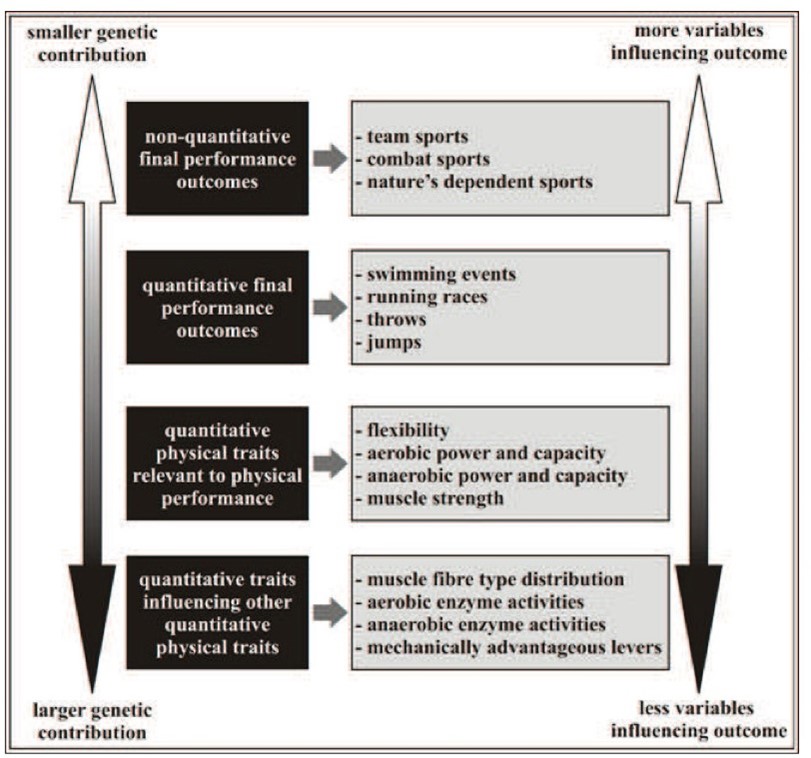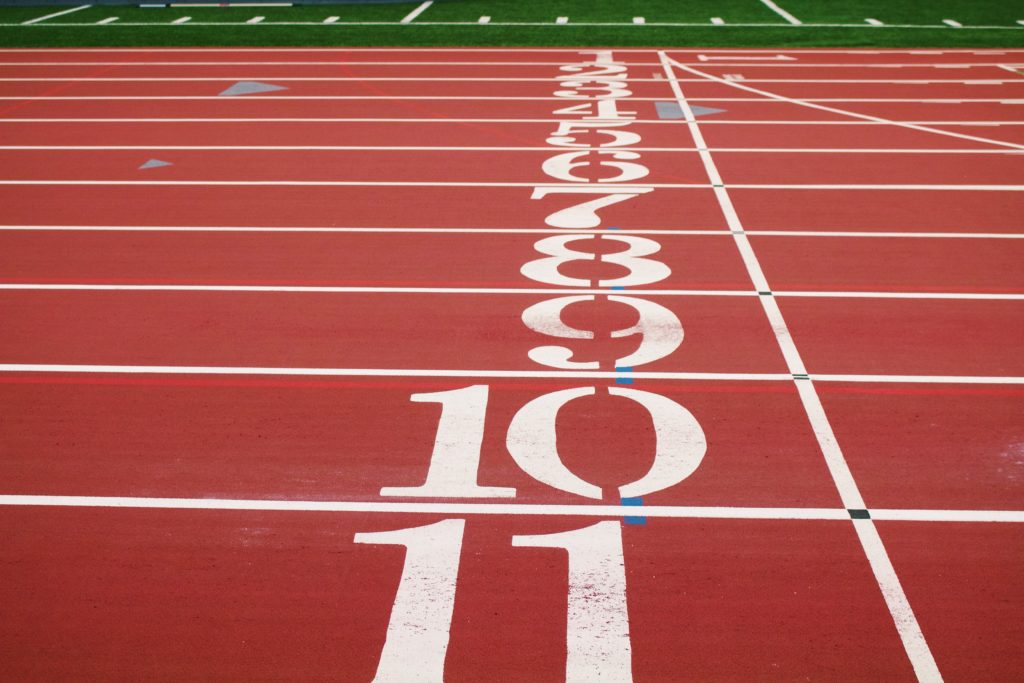Genetics in Sports (2)
Genetics in sport is a hot topic amongst sport enthusiasts. It is hard to imagine that sport success does not involve genetics to some degree.
It turns out that sport performance is a complicated concept due to the many factors that influence it. Out of these factors, there are intrinsic and extrinsic factors. Genetic composition is an intrinsic factor. Other intrinsic factors that affect sport performance are one’s motor behaviour, physiology, and psychology.
The factors which people are most familiar with tend to be the extrinsic ones. These can include training plan, nutrition, development opportunities, overall health, and one’s general context. These examples do not make a complete list but are some of the more familiar ones. As you may be starting to understand, these varying implications mean that there is not one successful formula to make a perfect athlete.
Traditionally, society accepts that hard work pays off because this puts an individual in control of their own fate. But what about genetics? Genetics are entirely out of one’s control. Well, some of the academic literature explains that many high performing athletes do not have the most favourable genetic components, but they succeed in their respective fields because sport performance is so complex and is influenced by so many factors. So, to what degree does one’s genetic composition truly affect their performance in sports?
The Complexity of Human Genetics (2)
The area of study of genetics and sport is still a recent one. It expanded more recently due to biotechnological advances, but is still considered a relatively new field of study.
To give perspective as to the complexity of this field of study, there are more than 200 genetic variations observed in athletes. However, only about 10 genetic variants have been consistently associated with sport performance. This comes from more than 20,000 genes that the human genome holds. This means that there are likely many more genetic variations that can have an impact on sport performance, but they have yet to be observed.
To add to this complexity, different sports will have different physiological requirements which means that some genetic predispositions might be better suited for certain sports compared to others. Adding a level of difficulty in describing which genes lead to optimal athletic performance.
The Importance of Sport Type (2)
Sport performance means very different things from one sport to the next. On the one hand, performance in swimming, for example, is largely associated with a quantitative measure of time. On the other hand, an individual’s performance in sports like basketball is evaluated from many different angles such as points, assists, blocks, steals, and much more.
With these different ways of measuring success, it also means that genetics will play a very different role in every sport. As the figure below demonstrates, team sports can have non-quantitative final performance outcomes, in which there is a smaller genetic contribution. However, sports involving more of a quantitative final performance outcome require a slightly larger genetic contribution. The more there are other variables influencing the outcome, the less genetics will contribute to performance. In all sports, genetic contribution plays a lesser role than the other variables influencing the outcome. In fact, the largest genetic contribution is associated with quantitative physical traits that are less influenced by other variables (e.g. muscle fiber type).

Another way of looking at the genetic impact of different sport types is its predictability. More predictable sports like weightlifting will have more of a genetic implication than unpredictable sports like hockey where opponents greatly affect outcomes.
Ethical Concerns (2)
As more information becomes available to evaluate genes, some academics have described the plausibility of testing for certain genetic variants in youth. Testing for genetic variants would signify that one could find young individuals who would be more likely to achieve elite level sport performance. In turn, these athletes could be enrolled in optimized training programs to ensure, as best as possible, that they become the best athletes. The applicability of this thinking could be revolutionary for sports. However, the ethical considerations around a pre-determined athletic course for high-potential youth needs to be considered.
Despite already being considered unethical by officials in Europe and the U.S.A., some argue that the predictive power of genetic testing in youth will never be good enough to predict sport performance. Some worry that there are concerns related to how families would use this information if they found genetic predispositions in their relatives during youth. Some also bring up the point of privacy and the fact that the information could be used in discriminative ways. Further, some argue that it would bring about professional misconduct and lack of opportunities if coaches and trainers had access to such knowledge.
And what if a child knows that it does not have the perfect genes for a given sport? Is it okay that they may not even want to participate in that sport? The ethical concerns are endless.
Genetic Research Opportunity (2)
While these ethical questions are certainly legitimate and, in some ways, frightening, there is potential for genetic testing to help improve exercise prescription and optimize training responses for people who are not athletes. This could benefit society as a whole and give health professionals additional tools to help individuals. This side of the coin is one that could revolutionize exercise prescription in people who are not elite athletes.
Even so, we must question how we could truly provide this information to those who need it most without the detrimental potential outlined above. Maybe appropriate regulation is the key? Maybe giving people the benefit of the doubt? But then again, who would have access to such tools? Social inequalities are bound to be an issue with these possible genetic considerations. Many questions remain before the genetic information can be properly utilized by society at large.
The Question of the Olympics (1)
It is not uncommon to associate heredity with elite and Olympic athletes. For many who do not compete at this level, it may simply be inexplicable to think that certain athletes can do what they do without some sort of inherent gift.
Early studies from the 1968 Mexico Olympics and 1976 Games in Montreal were not able to show that there were genetic differences between non-Olympians and the Olympian athletes. Unfortunately, these results were considered inconclusive due to the limitations in genetic evaluation at the time. The first true genetic or inherited attribute that was found in Olympic athletes was observed in the 1990s in the sport of cross-country.
The evidence was found in an Olympic athlete who had won many Olympic medals. This athlete, along with other relatives, were found to have a very high red blood cell (RBC) count. RBC carry oxygen and when one has a high level of RBC, they can better feed the muscles. This is an advantage especially in endurance sports. This hereditary trait has been seen in other individuals but remains a very rare occurrence. Despite the obvious advantage of this oxygen carrying quality, individuals would still need a favourable environment to be able to optimize sport performance.
Geographical Implications – The Case of Runners (1)
Geography of one’s ancestral or hereditary roots is also a factor in sport performance success. Running is a sport in which this phenomenon is omnipresent. Firstly, much of the successful sprint runners in the past have come from African American descent, born in the USA or Caribbean Islands such as Jamaica. What is most intriguing in this instance is that most of their roots stem from West Africa.
Secondly, endurance running, which favours a different physiology than sprint running also has a geographical component to its success. The dominant athletes in distance running have largely been from East Africa. Notably, they have come from Kenya and Ethiopia. To make this point even more incredible, the top-50 all time male marathon runners all come from East Africa. The geographical implications of long distance running performance is also present in female runners.
Interestingly, of the dominant Kenyan runners, most come from a single tribe in Kenya called the Kalenjin. It supports the notion that being born in a certain place gives way to shared genetics or key environmental factors which can lead to success in a sport.
This evidence does not automatically give way to the fact that genetics are ultimate predictors of performance. However, it seems to provide a strong enough case for the importance of genetics in sport performance. The evidence is still lacking, despite the important amount of research conducted, as to the specific genetic components that lead to the success of these athletes.
“Of note, altitude, training-related aspects, habitual diet, cultural aspects, and socioeconomic factors are also contributors of sports success.”
Tucker et al., 2013
Conclusion
As demonstrated above, genetics is only a factor among so many others that affect sport performance. Different sports will also have varying degrees of genetic importance. Despite some sports having a larger dependence on genetics compared to others, the role of genetics will not supersede the role that the accumulated intrinsic and extrinsic factors will play in sport performance. This is good news for those who aspire to become elite level athletes.
In addition, it is important to keep in mind that some sports may be suited to some individuals better than others but that should never be the reason to participate or not in a particular sport. Sport participation is beneficial to people’s health in many ways and people should not focus solely on sport performance.
References
- Guilherme, J. P. L., & Lucía, A. (2019). Introduction to genetics of sport and exercise. In Barh, D., & Ahmetov, I. I. (Eds.). Sports, Exercise, and Nutritional Genomics (pp. 3-22). Academic Press.
- Guilherme, J. P. L. F., Tritto, A. C. C., North, K. N., Lancha Junior, A. H., & Artioli, G. G. (2014). Genetics and sport performance: Current challenges and directions to the future. Brazilian Journal of Physical Education and Sport, 28(1), 177-193. https://doi.org/10.1590/S1807-55092014000100177
- Tucker, R., Santos-Concejero, J., & Collins, M. (2013). The genetic basis for elite running performance. British journal of sports medicine, 47(9), 545-549. http://dx.doi.org/10.1136/bjsports-2013-092408





